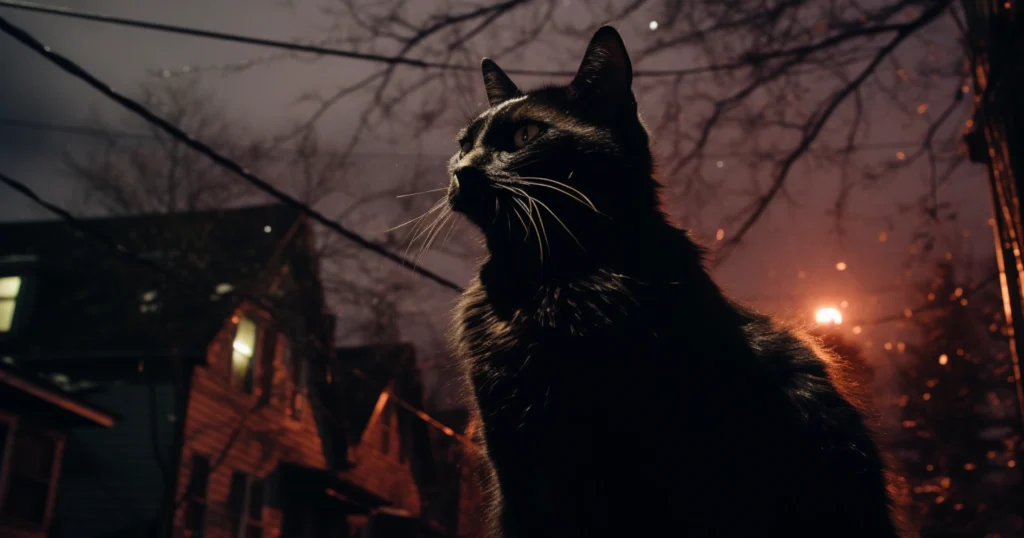It’s a familiar scene – your cat sits perched on a windowsill, intently gazing at some invisible point in your living room. Their eyes remain transfixed on…nothing. No toys, insects or lights – just empty space. As you call their name and wave your hand in front of their face, their staring remains unbroken. Even strangers walking by elicit no reaction. It’s like they are hypnotized by an unseen force only they can see.
This mysterious staring behavior is actually quite common in cats. While it may seem bizarre to us humans, our furry feline friends have several valid reasons for apparently zoning out on empty space. Understanding the intriguing cat stare provides insight into our enigmatic pets. This article will explore the many explanations for cat staring and when it may indicate a health problem needing veterinary attention.
Excellent Vision Lets Cats See What Humans Can’t

One major reason for cat staring – they simply see things we don’t! Cats have an expansive 225-degree field of vision, allowing them to see almost all around them without needing to move. Their eyes even have a reflective membrane layer that amplifies dim light up to six times better than human eyes. This means cats can detect subtle movements and tiny prey in areas that appear pitch black to us.
So while that corner looks empty to you, your cat may be watching dust particles dance in a ray of sunlight or a tiny spider building a web. Their intense stare helps them remain perfectly still and focused when spotting potential prey. So next time your cat stares at a bare wall, remember they are likely watching minute stimuli invisible to human eyes.
Cats Constantly Monitor Their Territory

In addition to spotting hidden stimuli, cats also stare off into space while monitoring their territory. As natural loners and predators, cats are vigilant about surveying their environment. Their staring allows them to use their superior vision and hearing to watch for any potential threats or prey entering their domain.
Your cat may be intently listening for mice in your walls, watching birds visiting the birdhouse outside, or keeping alert for neighborhood cats intruding on their turf. Since their territory extends beyond your home, cats often stare out windows as they observe happenings outdoors. Their gazing helps them remain aware of their surroundings and keep their territory secure.
Cats May Be Interacting With Spirits or Ghosts

While less scientific, some cat lovers believe felines stare due to their ability to see spiritual entities invisible to humans. Tales of cats having one paw rooted in the spirit world date back to ancient Egypt. Some myths claim cats can see ghosts, angels, demons and otherworldly beings.
While not proven by science, cats do seem to focus their attention on unseen stimuli and unseen forces. Their heightened extrasensory perception may allow them to detect subtle energies and spirits present around them. If your cat stares above your head at the ceiling, who knows – they may be interacting with a ghostly visitor you simply can’t perceive!
Medical Causes of Cat Staring

While most cat staring is normal, excessive staring may indicate an underlying medical issue needs veterinary attention. Staring blankly can be a symptom of:
- Cognitive Dysfunction Syndrome – Just like elderly humans, senior cats can suffer age-related cognitive decline leading to confusion, forgetfulness and zoning out.
- Partial Seizures – Cats experiencing small focal seizures may daze off, stare into space and be unresponsive.
- Compulsive Disorders – Repetitive staring behaviors may stem from anxiety, OCD or other compulsive disorders in cats.
- Hallucinations – In rare cases, conditions like feline hyperesthesia syndrome can cause cats to hallucinate. They may hiss, flee or stare at stimuli only they perceive.
Schedule a vet exam if your cat’s staring seems excessive or is accompanied by other concerning symptoms. Your vet can check for underlying medical issues requiring treatment.
Cats Stare When Relaxed and Content

Sometimes the reason for cat staring couldn’t be simpler – they are just relaxed and zoning out! Staring off into space is normal cat behavior indicating a calm, contented state. An unfocused gaze shows your cat is withdrawn into their inner world – just spacing out and enjoying some mental downtime.
Cats are natural loners and stare into space to fulfill their needs for solitude. Slow blinking while staring conveys a pleased, blissful mood. Meditative staring allows bored cats to entertain themselves and relieve stress. So occasional zoning out is actually a healthy cat behavior and nothing to worry about.
Ways to Redirect a Cat’s Staring

While some staring is normal, excessive staring may mean your cat needs more environmental enrichment and mental stimulation. Here are some tips to redirect your cat’s focus in a healthy way:
- Move their staring spot by blocking it or putting a plant or cat tree there
- Distract them with high-energy play sessions to break the stare and wear them out
- Give them a food puzzle or hide treats around your home to engage their hunting instinct
- Use catnip, window perches and new toys to provide sensory stimulation
- Vary their routine and interact with them more frequently to relieve boredom
Conclusion
The key is fulfilling your cat’s needs for activity and environmental change. With a little extra attention and redirection, you can stop problematic staring and help your curious cat focus their gaze on healthier stimuli.
So next time your cat stares off into space, remember – they simply perceive their surroundings differently. While the intent behind their faraway gaze may remain mysterious, understanding the potential reasons provides insight into our beguiling feline friends. Their tendency to stare at invisible stimuli highlights the unique inner and outer worlds known only to cats.


